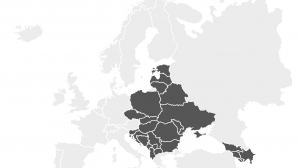Increasingly, more young Belarusians are choosing a career in the IT sector. In 2010, some 20,000 people had a job in the industry and that number grew to 36,000 in 2015, according to the Belarusian National Statistical Committee. Out of those, 25,000 software engineers work in companies that are residents of High Tech Park Belarus (HTP).
A world of celebrities
“Five years ago an IT specialist seemed like an average employee, but today the image has changed almost beyond recognition. They are now seen as ‘rock stars’ who determine the future of an industry which is expanding very rapidly. The first successfully arranged deal between Facebook and a Belarusian start-up, MSQRD, is a striking example of such a transformation,” says Evgeny Radionik, Head of External Affairs at Uniter and the author of the IT Industry in Belarus 2016 report.
“Almost every week a new and successful start-up hits the headlines, describing how it has improved the lives of millions of people and brought significant profit to its members. Any high school graduate, who is about to choose their future profession, realises that they can apply their skills and become a part that transformation. This gives this profession a sense of significance that is almost magical. It’s the key to a world of opportunities and self-fulfilment. It’s almost like in a Hollywood movie: fancy offices, flexible working hours, flat hierarchy, smart people and democratic atmosphere,” says Nickolay Tsarik, CEO of Jazz Pixels.
In such circumstances, new companies are springing up like mushrooms. According to dev.by, there are over 970 IT firms in Belarus (including 167 in HTP) and only 24 of them are state-owned (less than 2.5 per cent). In 2015, annual revenues in the sector exceeded $1.1 billion and were 14 per cent higher than in 2014.
“Over the recent years the government has created a complex infrastructure which is welcoming to the steady development of IT industry. These days it is the most rapidly flourishing sector in the country’s economy and that can only attract more and more people who want to build a successful career in IT,” says Iya Nekrasova, CEO at InToSoft.
IT is in fashion
According to the recruitment portal HeadHunter and the news site Tut.by, Belarus’ demand for IT specialists is growing by 25-30 per cent annually.
“Universities are continually reviewing their curricula to meet the evolving needs of IT companies and businesses, at large. IT literacy has become a part of the programme of studies in schools,” says Sergei Levteev, Chairman at IBA Group.
“This year the competition for IT-related courses at universities was the highest and only the people with the highest grades were admitted. That means we get the best students in the country and that also means there is enormous potential for the industry,” says Dr Valery Tsepkalo, the director of Hi Tech Park (HTP), said in an interview with Emerging Europe.
InToSoft’s Ms Nekresova says that world-known Belarusian tech giants such as EPAM and Wargaming have also made their contribution to the enhancement of education. “Nowadays, we have accumulated the best world-quality experience, here in Belarus, and our specialists have the possibility to absorb them and to go further,” she adds.
Dmitry Khanevich, CEO at Omertex says that IT is a prospective, modern and dynamic sphere where young and talented people create amazing projects and products, which can be used by the whole world. It helps to discover their potential and to realise their ambitions. “The atmosphere is friendly and creative and if a young person is diligent and smart enough, they will gain good benefits, a career and success. The number of IT courses and academies is also rising,” he says.
“A job in the IT industry is the most prestigious, attractive and fulfilling in Belarus. Even people who have never worked in the IT industry, are starting to seek an IT education and are beginning to work in the domain of IT,” says Ruslan Makarski, CFO at Aristek Systems, Ltd.
“The market offers lots of jobs that provide a relatively easy entry point to the IT industry, i.e. in software testing,” says Svetlana Pravdina, CEO at A1QA.
IT pays off
“There is no doubt that for a young person the main criterion which influences their occupational choice is the high income of IT specialists. Currently, the median salary in the IT sector reached $1,350 in 2016, according to dev.by, while he country’s average general salary level only reached $375, according to the National Statistics Committee,” says Uniter’s Mr Radionik.
“Over the last ten years, the average developer’s monthly salary has grown by over 300 per cent (from $500 to $1700). As from 2016, IT is the highest-paying industry in the country,” says Igor Bessarab, CEO at R-Style Lab.
IBA Group’s Mr Levteev says it is difficult to predict how salaries are going to change. “Several factors are having an impact on the industry, such as government policies, the economic situation and international rules that regulate workforce influx and outflow. IT salaries in Belarus have already been mentioned in international salary ratings,” he adds.
Uniter’s Mr Radionik expects the salary increases in the IT-sector will slow down somewhat in the coming years as a direct result of regression in the field of IT-outsourcing.
“Statistics show that for the past two years, the largest companies which deliver outsource services, have been slowing down the pace of development. This is the outcome of global trends as well as the fact that we are hitting the ceiling on the Belarusian labour market. Nevertheless, we still expect differentiation of the sectors and growth in the salaries of the most highly-qualified specialists, who will be working for product companies,” Mr Radionik adds.
“We expect that salaries will grow rapidly in the technologies where there is disproportionality between the demand for specialists and the labour market supply. Salaries will grow insignificantly in those technologies where there is parity between demand and supply. The wage increase will always be limited by the man-hour cost to the client. Notably, the latter can’t be higher than the cost of keeping a similar specialist, on staff and taking into account all the expenses of taxes, head hunting and the social safety net,” says Jazz Pixels’ Mr Tsarik.
Engineers expect more now
R-Style Lab’s Mr Bessarab adds it is more than just financial goals that is driving young people’s interest in getting a degree in computer science in Belarus.
“IT employees enjoy multiple benefits that include: health insurance, flexible working hours, gym memberships, free English classes, free professional courses and lectures and corporate parties. 70 per cent of Belarusian IT specialists are aged 28 or under; they are ambitious, forward-thinking, creative and stereotype-free young people who love their country and who want to change it for the better. IT companies offer a perfect environment for ‘millennials’ so it’s no wonder the Belarusian IT workforce has been growing by 35 per cent, per year, since 2006,” adds Mr Bessarab.
“Travel opportunities, enabling to exchange experience and best practices with foreign colleagues, are also very attractive for young people,” says Oksana Mogulenko, CEO, SolbegSoft.
“IT companies offer a modern environment and infrastructure and enable a person to develop and grow professionally. The great advantages are a possibility to gain experience of working in or with international teams and to obtain international certificates, recognition of professional achievements and an extended benefit package,” says IBA Group’s Mr Levteev.
“One of the most important reasons for choosing an IT career is the stability of the labour market – there is no high risk of unemployment, after graduation, as employers often fight over talented candidates, not vice versa,” says Dmitry Karpovich, CEO at Oxagile.
“Young IT companies set high benchmarks for salaries and work conditions. As a result, employee retention has become a challenge for mature companies. Employee turnover in most medium-sized companies is between 10 to 16 per cent. Companies support employees through educational and social programmes, as well as involvement in innovation and career development initiatives,” says IBA Group’s Mr Levteev.
Competition is growing
“It has become even more competitive, but it’s a competition for the employer, not for the employee: companies are struggling to hire enough talent when there is clearly a shortage of people on the market,” says Mitya Smusin, CEO at Yellow.id.
“The Belarusian State University of Informatics and Radio electronics (BSUIR) and the Belarusian State University (BSU), the country’s leading higher educational establishments in the IT sphere, have been facing a constant inflow of gifted youth. They also have strong links with the biggest companies in the industry, resulting in almost certain job placement straight from university,” says Oxagile’s Mr Karpovich.
“Unfortunately, Belarusian universities are not able to prepare skilled personnel in the right quantities for industrial demand. For this reason, various extension and retraining courses are now beginning to make an appearance, even in IT companies. It should be noted, that Belarus has a really good background in engineering education, which favours the creation of qualified specialists in related professions and who could also be very rapidly retrained into IT-specialists,” says Uniter’s Mr Radionik.
Companies are already trying different solutions to make sure they have enough talent. A1QA’s Ms Pravdina says her company is used to hiring young people with no relevant experience in software testing. “We teach them in our proprietary educational centre, QA Academy, and offer employment to the best of them,” Ms Pravdina adds.
Various institutions across the country are also making sure the demand for IT jobs will remain stable. Hi Tech Park organises meetings with students and their parents to show them the benefits of technical education, and to talk about salaries and working conditions, etc.
Bright future ahead
“Although 70 per cent of Belarusian companies show little to no profit, the IT industry drives the country’s export growth and shows no signs of decline,” says R-Style Lab’s Mr Bessarab.
As more US and EU companies realise the benefits of outsourcing their software development to Eastern Europe, competition will become even higher and salaries will grow further. Will that growth remain sustainable in the years to come? HTP’s director sounds very confident: “Yes, each year the reputation of IT education improves and becomes more popular,” Dr Tsepkalo concludes.






The increase of those workers moving into the IT sector will give Belarus a competitive advantage in the Global Economy as the growth of digital continues to demonstrate high growth.